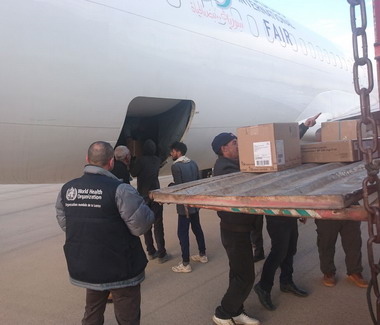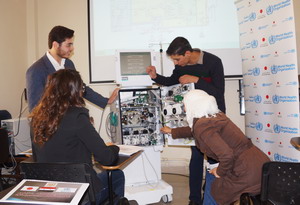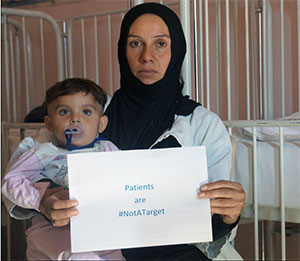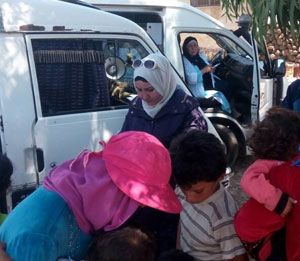WHO airlifts 21 tons of medical supplies to Al-Hasakeh governorate in north-east Syria
 14 September 2018 – The World Health Organization (WHO) yesterday airlifted 21 tons of essential medical supplies and vaccines to Al-Hasakeh governorate in north-east Syria. This is the fourth time this year that the Organization has delivered emergency health supplies to the governorate.
14 September 2018 – The World Health Organization (WHO) yesterday airlifted 21 tons of essential medical supplies and vaccines to Al-Hasakeh governorate in north-east Syria. This is the fourth time this year that the Organization has delivered emergency health supplies to the governorate.
Generous donation of medical equipment from Japan boosts public health services in Syria
 WHO, in cooperation with the Government of Japan is training the medical engineers who will be using the equipment. All photos: WHO Syria 20183 September 2018, Damascus, Syrian Arab Republic – The World Health Organization (WHO) welcomes the generous donation from the Government of Japan which has enabled WHO to procure advanced medical equipment. The equipment, worth over US$ 12 million, is the largest donation received by WHO in Syria. It includes magnetic resonance imaging scanners, ultrasound machines, echocardiography equipment, X-ray machines, respirators and other items. WHO in Syria will distribute the equipment to public and university hospitals throughout the country.
WHO, in cooperation with the Government of Japan is training the medical engineers who will be using the equipment. All photos: WHO Syria 20183 September 2018, Damascus, Syrian Arab Republic – The World Health Organization (WHO) welcomes the generous donation from the Government of Japan which has enabled WHO to procure advanced medical equipment. The equipment, worth over US$ 12 million, is the largest donation received by WHO in Syria. It includes magnetic resonance imaging scanners, ultrasound machines, echocardiography equipment, X-ray machines, respirators and other items. WHO in Syria will distribute the equipment to public and university hospitals throughout the country.
Attacks on health care on the rise throughout Syria in first half of 2018, says WHO
 19 August 2018 – 8 years into the conflict in the Syrian Arab Republic, attacks on health care facilities and personnel in the country continue to rise despite United Nations resolutions strongly condemning these attacks. In the first 6 months of 2018, there were 126 separate attacks on health care in Syria – more than for the whole of 2017. Syria now accounts for a staggering 70% of all attacks on health care facilities documented by WHO worldwide.
19 August 2018 – 8 years into the conflict in the Syrian Arab Republic, attacks on health care facilities and personnel in the country continue to rise despite United Nations resolutions strongly condemning these attacks. In the first 6 months of 2018, there were 126 separate attacks on health care in Syria – more than for the whole of 2017. Syria now accounts for a staggering 70% of all attacks on health care facilities documented by WHO worldwide.
Critical funding shortage threatens WHO’s response in northwest Syria
 20 August 2018 – As the conflict in northwest Syria escalates, WHO is appealing for US$ 11 million to provide life-saving health care to people in parts of Aleppo, Hama, Idleb and Lattakia governorates.
20 August 2018 – As the conflict in northwest Syria escalates, WHO is appealing for US$ 11 million to provide life-saving health care to people in parts of Aleppo, Hama, Idleb and Lattakia governorates.
Hundreds of thousands of people, many of whom have been previously displaced, may be displaced yet again as they flee growing insecurity and violence. The situation in Idleb is particularly dire; more than half a million people have been displaced to and within the governorate since January 2017.








